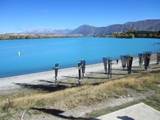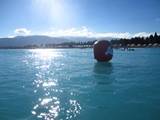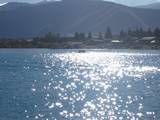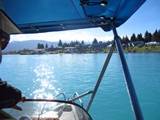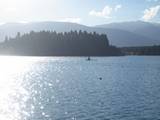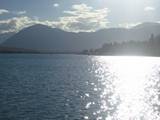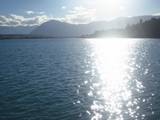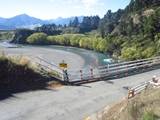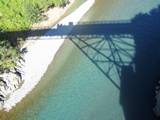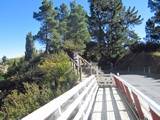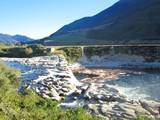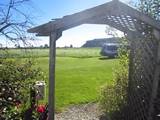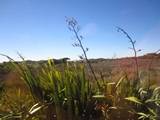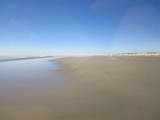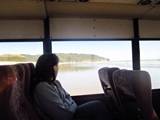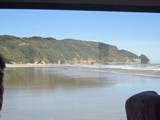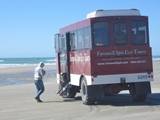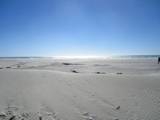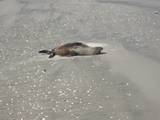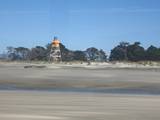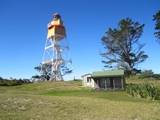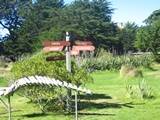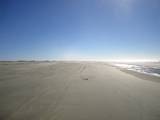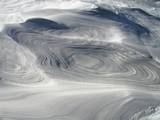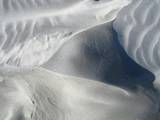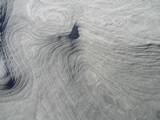Twizel to Takaka - 27/03/2012 to 6/04/2012
Some of us had a good week at Twizel while others, however, have gone away not so happy with the results. The sun shone most days, long after the frost cleared; the wind only upset one day of rowing and the snow on the hills did eventually melt. It’s a shame six months hard work for kids so young can come to such a sad end after six minutes of racing. Some will have another shot next year but unfortunately for others their school rowing days are over with little recognition by way of a medal, but they will always take away the spirit of competition and kindred feeling of being part of a team. One Takapuna lad will take away a bit more than others after consuming a half bottle of Vodka at the Maadi Party [But he did leave quite a bit behind - Ed].
Unfortunately my nephew didn’t get to take home the two gold medals he hoped for, but after two hard fought races he has collected two bronze medals and top ten badges. Silent victory for my brother whose old school took out the Springbok Shield. Well done to Christ’s College for taking out the Maadi Cup, but then again when your parents spend thousands of dollars paying for you to be based 3 hours from your home on the lake, for several months, eating Angus steaks and salmon, you would expect nothing less (yes, I’m bitter about it).
Ruataniwha Rowing (was South Island Rowing) were very hospitable to us, 30 free drinks tickets, several casual dinners and friendly volunteers kept us well entertained. It got us over the bad rostering, chilly mornings and senior moments of some volunteers. We and the PR team (KRI spies) have learned a few things from our South Island counterparts ie more casual social events and BBQ lunches for volunteers are required.
We left Lake Ruataniwha, Twizel, on Sunday the 1st of April and headed to Hanmer Springs via Geraldine and Christchurch. We caught up with the Westlake team at Geraldine who were elated that four of their boys had made Junior and U18 trials, including my nephew. We however never quite made it to Hanmer due to time constraints and the excitement of being able to shop at a Pak 'N' Save; instead we opted for Amberley Beach.
Monday we went as far as Murchison, famous for a 7.8 magnitude, 1929 earthquake. NZMCA has a lovely property there and Murchison has a museum with lots of old school photos of my father’s aunts and uncles. The poor sods had to walk 2 ¼ miles to school every day through very cold valley farm country. They lived on the Owen river and unfortunately I couldn’t get copies of the school photos or records because today was newsletter day and the volunteer Octaterians didn’t know how to use the interrupt button on the photocopier.
Tuesday morning we went to Motupiko where Roger’s grandfather once owned a general store/garage, but it's long gone, burnt to the ground many years ago. The small town is right near Quinney’s Bush where we use to go as kids to a large reserve with many flying foxes and swimming holes. The Quinneys were shut down and it is now a giant nasty campground that charges $10 for a look and $50 if you park at the gate and look without permission. I hope they refunded the money to the 50% of the 600 campers evacuated at Christmas due to the rain. We parked across the road (for free) and did a geocache in the church yard where the Quinneys are now buried.
Having already covered a large part of Nelson and the Nelson Lakes area on a previous motor home trip we headed straight to Motueka, via the scenic route, to try and get as close as we could to Collingwood to see the Spit and other things we didn’t see last time. This area of Nelson is full of orchards growing pip fruit such as apples, pears and table grapes; they also grow hops, kiwifruit and raspberries. Because of the warm client and seasonal work it attracts a few vagrant types, artisans and general dreadlocked hippies. There are galleries, cafés and produce stalls everywhere with a strong emphasis on fresh, organic, alternative, free living. So in true Nelson style we bought organic fruit and vegetables from Toad Hall, fresh fish from Talley’s port shop (finally) and headed off to cook it up in the backyard of my Granddad’s old pub.
My Grandparents use to own the Globe Hotel in Golden Bay which included a small dairy farm, milked solely by my father before and after school I am lead to believe. It is now called the River Inn and provides accommodation for backpackers and NZMCA motorhomers, the aforementioned keep the few locals entertained, who in turn help keep the bar stools warm and the publican in funds, just. I originally thought we could try the free camp near the bridge but the “eat, pray, love” nude campers already in situ were slightly off putting.
Wednesday we headed to Collingwood to catch a bus tour of Farewell Spit, unfortunately missing the tour by 15 minutes and so had to book for the next day. Not wanting to waste a day hanging around we went off to see more of Golden Bay, the museum – closed, the highly recommended Naked Possum Café and Shop – closed, Langford’s famous 1928 store – closed, The Old School Café – closed; we weren’t having much luck! There are plenty of walks in the area, but the landscape is so dry and windy, the roads are mainly shingle and travelling them is not much fun. So we headed to the Spit to the only open café – nice view, nice scones, crap coffee, too windy for geocaching, but you can get internet. We went back to the Old School Café in Pakawau, which allows NZMCA members to park in the school yard for free and listened all night to the pounding surf and the constant wind.
Thursday morning we finally got our Eco Farewell Spit Tour an hour after the time we were originally given. The 4WD bus took us right out to the lighthouse, along the sandy beaches and dunes, sometimes bumpy, sometimes wet, and sometimes obstructed by seals, birds and trees. Our informative tour guide described the wind, sea and sand patterns, gave a detailed account of all the birdlife, from what they ate to how they mate and where they go in the off-season. Occasionally he got us out of the bus to feel the sand, but was very cautious of where we went. This is a man who hates Maori because they ate all the wildlife, then killed the white man, which wasn’t a bad thing because he hates them for taking all the vegetation off the spit in order to farm it and failed. And where does all this sand keep coming from? Off the Southern Alps via the West Coast according to the Navy (and lot of rum makes for a good story).
Revitalised by a Chokito bar we headed off to free-camp at Pohara.

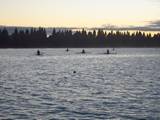
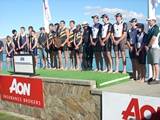
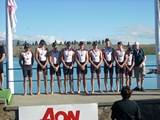
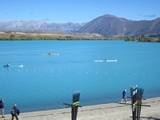
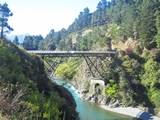
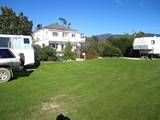
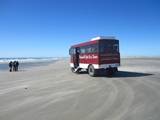
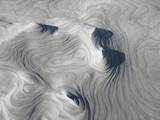
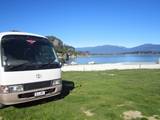
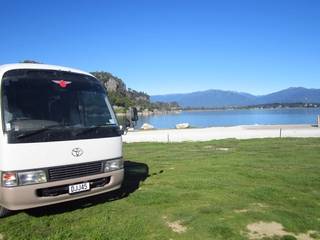 We woke up to this at Tarakohe
We woke up to this at Tarakohe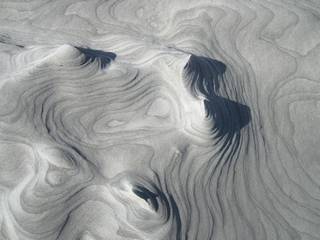 Wind-blown sand
Wind-blown sand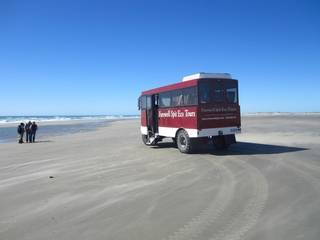 Four wheel drive bus, Farewell Spit
Four wheel drive bus, Farewell Spit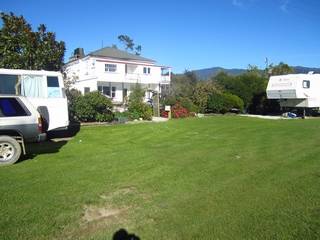 River Inn, Takaka
River Inn, Takaka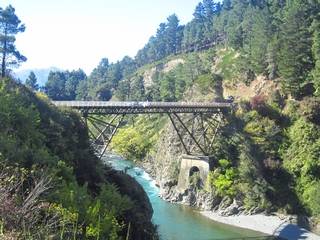 Hanmer Bridge
Hanmer Bridge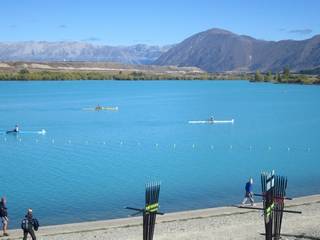 Lake Ruataniwha
Lake Ruataniwha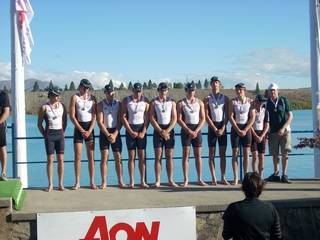 Maadi Bronze Medal 2012
Maadi Bronze Medal 2012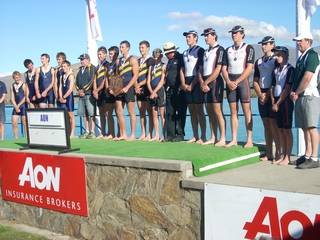 Springbok Shield, 2012
Springbok Shield, 2012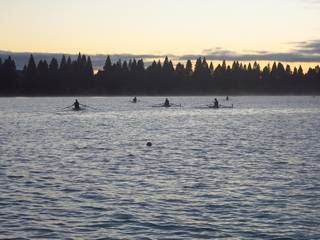 Rowers on Lake Ruataniwha
Rowers on Lake Ruataniwha